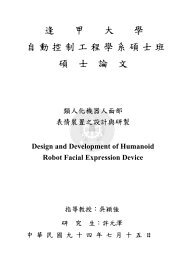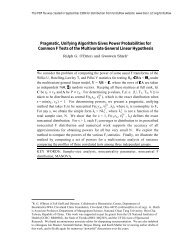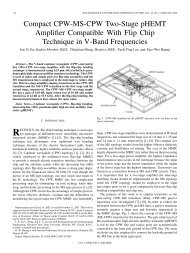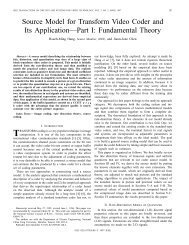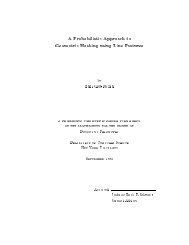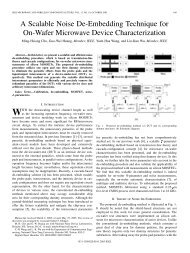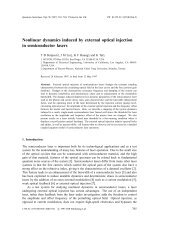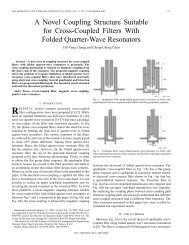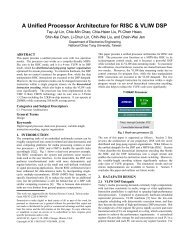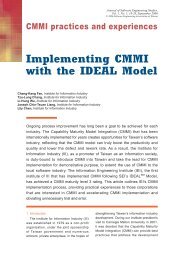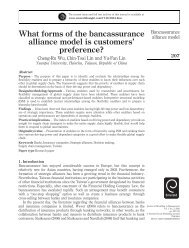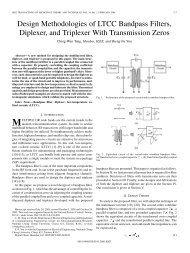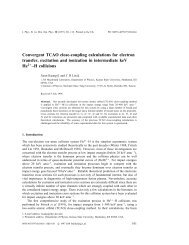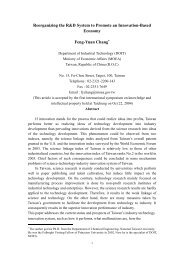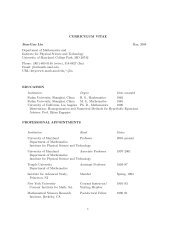Awards
Awards
Awards
You also want an ePaper? Increase the reach of your titles
YUMPU automatically turns print PDFs into web optimized ePapers that Google loves.
Selection Process – Nominations screened and reduced to a short list by a committee<br />
of the Editorial Board and submitted to the Communications Society <strong>Awards</strong><br />
Committee for final selection.<br />
Presentation – Annually (as soon as possible after recommendation). Award will not<br />
be given if a paper of high quality is not uncovered.<br />
Fred W. Ellersick Prize<br />
Prize – Plaque and honorarium up to $500 for each author; total not to exceed $1,000.<br />
Eligibility – Publication of an original paper in a Communications Society magazine<br />
(Communications Magazine, Network, or Wireless Communications) in the previous<br />
calendar year; author need not be an IEEE member.<br />
Basis for Judging – Quality, utility, timeliness, and clarity of presentation, comprehensible<br />
to the non-specialist.<br />
Nominee Solicitation – Nominations solicited by the Chair of Magazines Paper <strong>Awards</strong><br />
Selection Committee in consultation with Magazines Editors-in-Chief.<br />
Selection Process – Nominations screened and short list prepared by the Magazines<br />
Paper <strong>Awards</strong> Selection Committee with the approval of the Magazines Editors-in-<br />
Chief. The short list is submitted to the Communications Society <strong>Awards</strong> Committee<br />
for final selection.<br />
Presentation – Annually (as soon as possible after recommendation). Award will not<br />
be given if a paper of high quality is not uncovered.<br />
IEEE Communications Society/Information Theory<br />
Joint Paper Award<br />
Prize – A plaque and an honorarium up to $500 for each author; total not to exceed<br />
$1,000 for each paper.<br />
Eligibility – For outstanding papers published in any publication of the<br />
Communications Society or Information Theory Society the previous calendar year.<br />
The authors do not have to be members of IEEE. Presented annually.<br />
Basis for Judging – Quality, originality, utility, timeliness, and presentation. The paper<br />
should cover the interests and achieve the values of both the Communications<br />
Society and Information Theory Society.<br />
Sponsorship and Funding – Jointly sponsored by IEEE Communications Society<br />
(ComSoc) and IEEE Information Theory Society (IT). Funding evenly divided by the two<br />
sponsoring societies.<br />
Selection Process:<br />
(1) Each year ComSoc <strong>Awards</strong> Committee selects 1 or 2 candidate papers from the<br />
previous calendar year; and the IT <strong>Awards</strong> Committee also selects 1 or 2 candidate<br />
papers from the previous calendar year.<br />
(2) A subcommittee of 4 people is formed with 2 members appointed from each of<br />
the <strong>Awards</strong> Committees of the two Societies. This subcommittee considers the<br />
2 to 4 papers selected above and selects 1 or 2 papers as the winning papers.<br />
62<br />
I E E E C O M M U N I C A T I O N S S O C I E T Y



